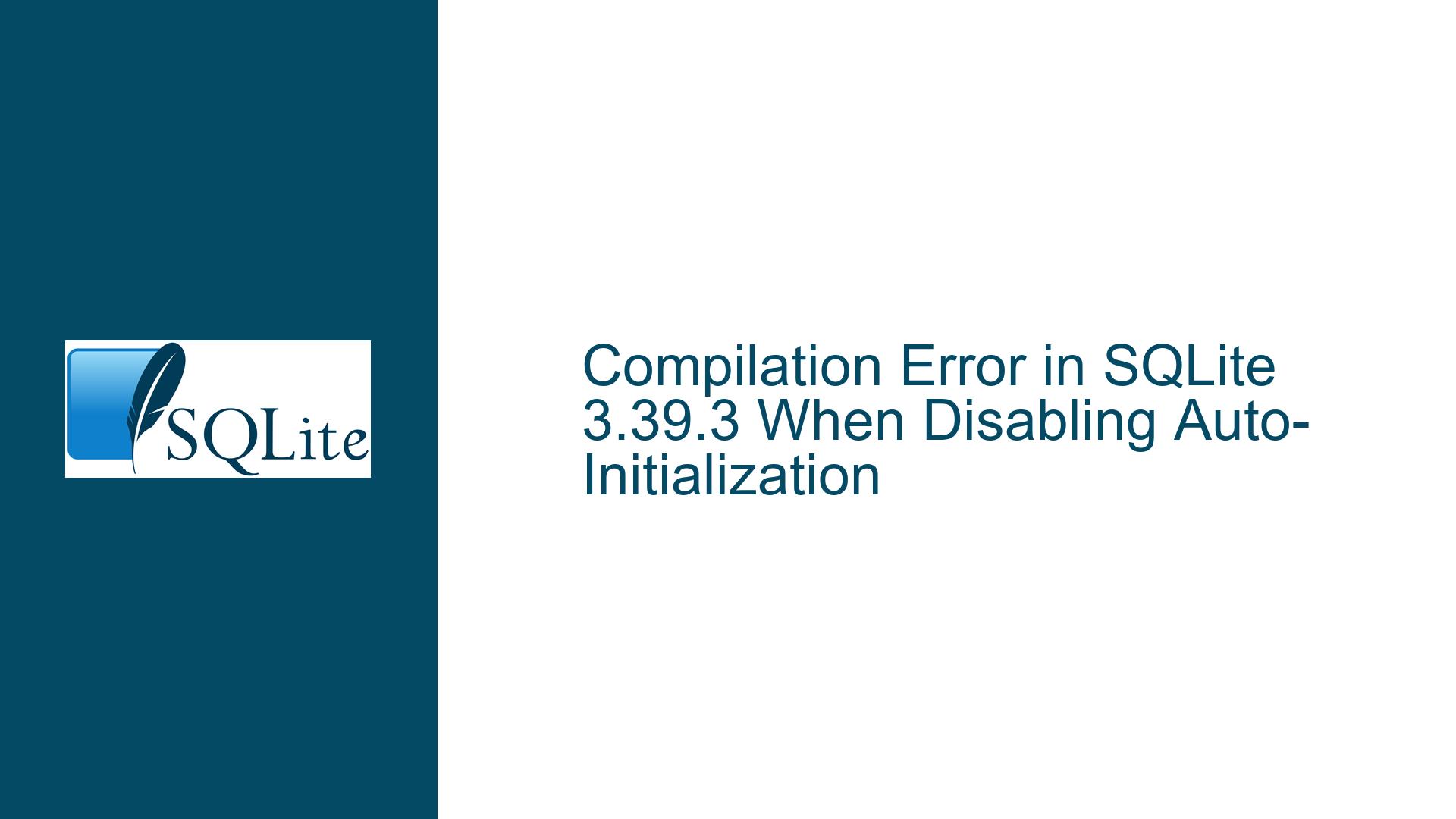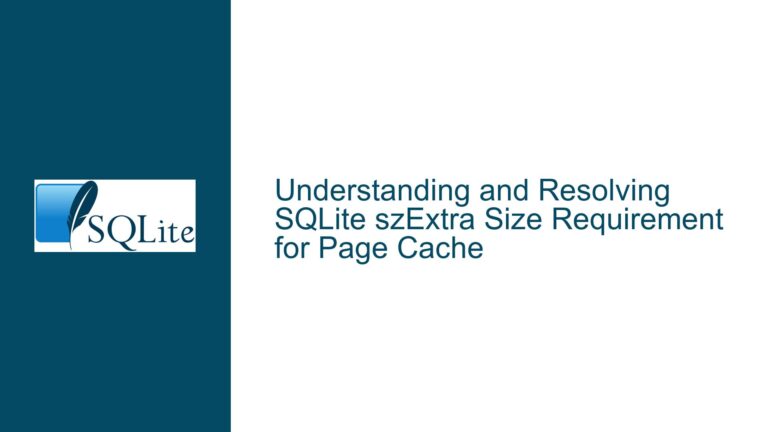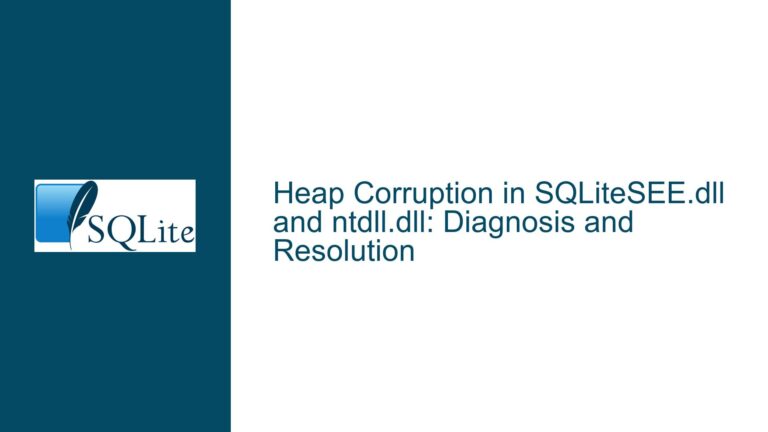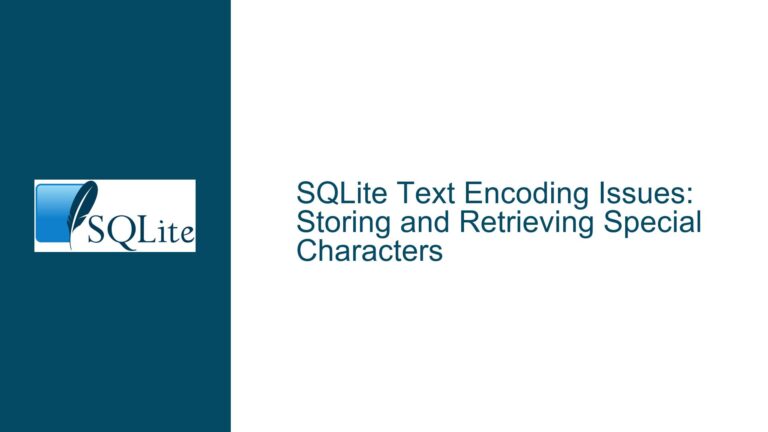Compilation Error in SQLite 3.39.3 When Disabling Auto-Initialization
Compilation Failure Due to Missing Variable Declaration in Windows Directory Configuration Function
Root Cause: Conditional Compilation of Auto-Initialization Logic in sqlite3_win32_set_directory8
The core issue arises from a mismatch in variable scope when the SQLITE_OMIT_AUTOINIT compile-time option is enabled in SQLite version 3.39.3. This option disables automatic initialization of the SQLite library, requiring manual initialization by the application. The problem manifests specifically in the Windows-specific function sqlite3_win32_set_directory8, which configures directories used by SQLite on Windows platforms.
In the affected version, the declaration of the integer variable rc (return code) is placed inside a preprocessor block that is conditionally compiled only when SQLITE_OMIT_AUTOINIT is not defined. However, subsequent code outside this block attempts to access rc regardless of whether SQLITE_OMIT_AUTOINIT is enabled. When the option is active, the compiler encounters an undeclared variable rc, resulting in a fatal compilation error.
The function’s structure prior to the fix is as follows:
SQLITE_API int sqlite3_win32_set_directory8(...){
char **ppDirectory = 0;
#ifndef SQLITE_OMIT_AUTOINIT
int rc; // Declared inside #ifndef block
rc = sqlite3_initialize();
// ... other logic using rc
#endif
// Code attempting to use rc outside #ifndef block
return rc; // Error: rc undeclared if SQLITE_OMIT_AUTOINIT is defined
}
This creates a dependency chain where rc is required for the function’s return value but is only declared when auto-initialization is enabled. The oversight violates the principle of variable scope consistency across conditional compilation paths.
Contributing Factors: Untested Compile-Time Flags and Evolving Codebase
Three interconnected factors contribute to this issue:
Legacy Handling of
SQLITE_OMIT_AUTOINIT
Despite being listed as a "recommended" compile-time option in SQLite’s documentation,SQLITE_OMIT_AUTOINITwas not rigorously tested in all code paths prior to version 3.39.3. The option shifts responsibility for library initialization from SQLite to the application, which reduces overhead but requires meticulous validation of initialization states in every API function.Incomplete Test Coverage for Platform-Specific Functions
Thesqlite3_win32_set_directory8function is Windows-specific and interacts with directory configuration logic. Such platform-specific code often exists in a separate maintenance and testing pipeline compared to cross-platform components. The absence of automated tests forSQLITE_OMIT_AUTOINITin Windows builds allowed the variable scope mismatch to go undetected during pre-release validation.Post-Release Tooling Enhancements
A new testing tool (omittest-msvc.tcl) was introduced after the 3.39.3 release to validateOMIToptions on Windows. This tool would have identified the variable scope issue earlier by compiling the code withSQLITE_OMIT_AUTOINITenabled and detecting the missingrcdeclaration. The timing of this tool’s deployment highlights the challenge of maintaining backward compatibility for niche compile-time options in a rapidly evolving codebase.
Resolution: Variable Scope Correction and Compile-Time Option Validation
To resolve the compilation failure, developers must address both the immediate code defect and the systemic gaps in testing compile-time options.
Step 1: Patch the sqlite3_win32_set_directory8 Function
Move the declaration of rc outside the #ifndef SQLITE_OMIT_AUTOINIT block to ensure it is visible in all compilation paths:
SQLITE_API int sqlite3_win32_set_directory8(...){
char **ppDirectory = 0;
int rc; // Declared unconditionally
#ifndef SQLITE_OMIT_AUTOINIT
rc = sqlite3_initialize();
// ... other logic using rc
#endif
// Additional code that may modify rc
return rc;
}
This change guarantees that rc exists even when auto-initialization is disabled. The variable is initialized implicitly to a garbage value, but since the function’s logic skips the auto-initialization step when SQLITE_OMIT_AUTOINIT is defined, the application must ensure the library is manually initialized before calling this function.
Step 2: Apply the Official Fix from SQLite Trunk
The SQLite development team addressed this issue in check-in f74a5ea8c986dc33. Developers can:
- Download the latest
sqlite3.camalgamation from the trunk. - Manually apply the patch to their local copy of
sqlite3.cby moving thercdeclaration. - Recompile the project with
SQLITE_OMIT_AUTOINITenabled to verify the fix.
Step 3: Evaluate the Necessity of SQLITE_OMIT_AUTOINIT
While this option is recommended for reducing overhead, applications that do not require fine-grained control over initialization should consider omitting it. If retained, enforce strict initialization protocols:
// Example manual initialization sequence
int main() {
int rc = sqlite3_initialize();
if(rc != SQLITE_OK) { /* handle error */ }
// Proceed with other SQLite API calls
sqlite3_win32_set_directory8(...);
// ...
sqlite3_shutdown();
}
Step 4: Integrate Updated Testing Tools
Leverage the new omittest-msvc.tcl script (or equivalent) to validate all OMIT options during continuous integration. This ensures that future code changes do not reintroduce similar scope-related defects.
Step 5: Monitor SQLite’s Compile-Time Option Documentation
The SQLite team has acknowledged the need to audit the status of SQLITE_OMIT_AUTOINIT. Developers should track updates to the Compile-time Options documentation to confirm whether this option remains recommended or is reclassified as unsupported.
By addressing variable scope inconsistencies and enhancing test coverage for conditional compilation paths, developers can mitigate similar issues in future SQLite integrations.






